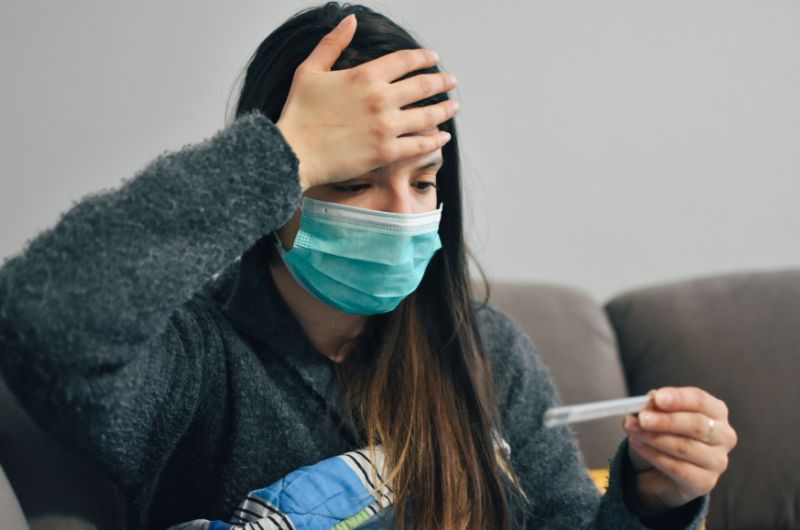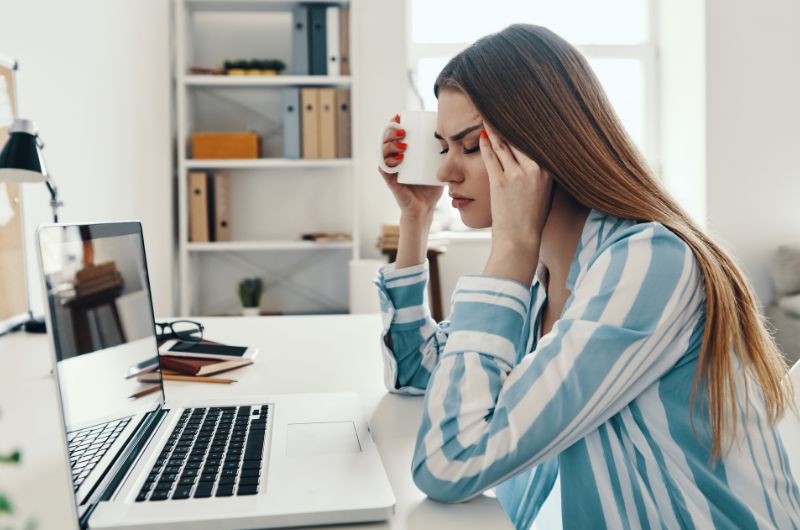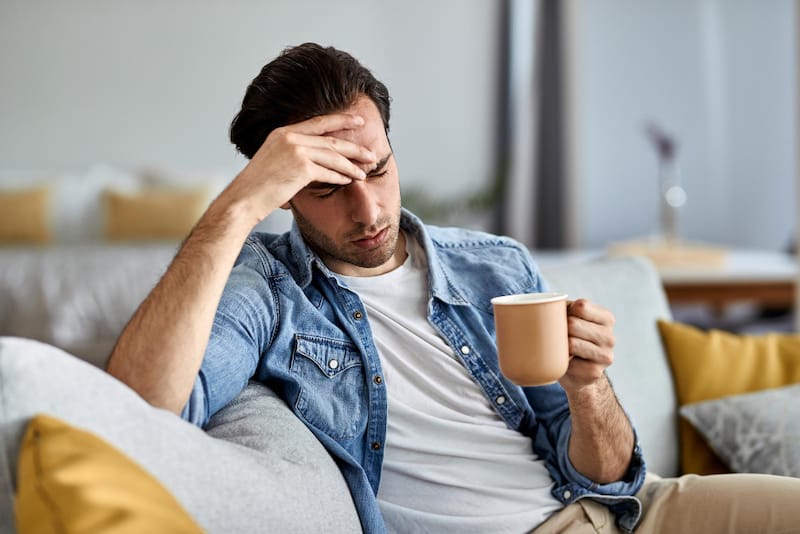One can develop sudden sensitivity to caffeine when recovering from covid. Our body takes a lot of time to recover from covid and eliminate the virus. Several people might go through a long-term covid which includes requiring a lot of rest, getting easily tired, and other physical or mental health symptoms. Limiting your caffeine intake or eliminating it for a while is the best. Caffeine could also affect your anxiety or induce it, accompanied by the stress of handling the covid happenings in the world. Focus on eating healthy, staying hydrated, exercising, and getting lots of rest. After a while, you could try reintroducing it in small amounts.
A lot of people can’t live without a caffeinated lifestyle, and they have to have their morning jolt, and some even survive on more.
But after covid took place, many after-effects were seen in patients, some even lasting for more than 6 months.
One such sudden change to things includes developing caffeine sensitivity. So those who love their daily dose of coffee find it even harder to swallow the bitter pill of leaving it behind for good.
But how does one go from feeling amazing after drinking coffee to feeling the worst possible version of themselves when continuing to drink it after covid? Let’s find out.
What is caffeine sensitivity?
Having a sensitivity to coffee is pretty common.
📌 The signs and symptoms may vary. In case of normal sensitivity, a person might be able to drink around 400 milligrams of caffeine daily, which is about four to five cups of coffee, without experiencing significant effects and can continue to do so.
About 10% of the population carries a gene for higher caffeine intake.
They could drink coffee late at night and still not suffer from unwanted wakefulness.
There’s also hypersensitivity to caffeine, where a person can’t even handle a small amount of caffeine intake.
Sensitivity can be described as feeling too awake and hyper after drinking a small amount of coffee, as if high on several cups of espresso.
One could suffer from the following:
- Racing heartbeat
- Headache
- Jitters
- Nervousness
- Anxiety
- Restlessness
- Insomnia
Can caffeine intake affect covid recovery?
Different people suffer from different symptoms after covid, and that’s pretty much evident to those who have seen their family members or even themselves when trying to recover.
Not only do symptoms vary, but after effects are different too.
On a personal note, I felt freezing, and it was terrible to the point where even after wearing layers of clothes, including a muffler and a beanie, and sleeping in a warm blanket wasn’t enough.

This went on for a month before I finally started recovering from those after-effects. That and total energy drain. Thankfully I didn’t develop a sensitivity toward coffee, but that might not be the case for others.
Coffee and caffeine present in other beverages could have the same effect. It could now lead to dehydration and negatively affect sleeping patterns, such as developing insomnia.
Having coffee and caffeinated drinks during recovery could delay your recovery.
Effects of caffeine after covid
This virus attacks both our physical health and mental health at the same time. You might have seen people with covid sleeping for long stretches of hours at a time and even needing naps during the day.
This could go on even after you’ve recovered from covid but could become one of the after-effects.
The caffeinated life you used to live before might not work for you after covid. Even decaffeinated coffee does contain traces of caffeine.
Our body needs rest not only physically but mentally as well. By trying to get back to your old active lifestyle accompanied by caffeine, your body isn’t getting enough time to generate energy and heal.
While no physical symptoms present of this virus, your body is still healing from within.
Your long-COVID recovery needs to take things slowly and eliminate the amounts of caffeine intake or reduce the quantity to the amount you can handle.
Lifestyle habits to change after covid
Fighting covid can be a long battle that needs a change in your lifestyle for the better. While giving up on some of these things might not feel good to you but is necessary.
- If caffeine is a problem, try eliminating it or reducing the number of cups you drink or the amount of coffee you take.
- While you’re at it, also eliminate alcohol, which includes the evening glass of wine or two.
- Instead, include lots of vegetables and fruits in your diet and eat balanced meals three times a day. Don’t even try to skip meals.
- Hydration is key. Drinking simple water might seem boring when you can’t have alcohol or caffeinated beverages, so include diffused water and coconut water as alternatives.
- Avoid consuming lots of sugar, salt, trans fat, and saturated fats.
- Some kind of physical activity is helpful. Only do as much as your body allows. Even if it’s walking for 30 minutes every day is all that you can do.
Could caffeine induce anxiety after covid?
Mental health is another aspect you should take care of other than your physical health. Most of us tend to ignore it, but during such times, there’s a particular need to look at how we’re doing mentally.

Not only covid and several lockdowns but a general mood of things have affected everyone, adding to the stress and elevating anxiety.
But drinking coffee on top of your mental health already suffering could be developing more anxiety.
Especially for people who have had a background of anxiety could be at an increased risk of having anxious reactions to drinking coffee during recovery from covid.
The same could be the effect of drinking alcohol on people. So there’s a need to limit these two things.
We are the best judge of our mental health. If you see yourself struggling to cope with drinking coffee during the recovery period, you should take actions to limit such intake.
Find effective ways to deal with and cope with anxiety.
FAQs
Why am I suddenly sensitive to caffeine?
A sudden sensitivity could develop for several reasons. Especially after recovering from covid could make things complicated and take a long time for people to return to their usual selves.
A virus such as covid is brutal and takes a long time to eliminate from the body completely. The body could no longer have the tolerance for coffee that it once did.
Limit caffeine intake or eliminate it and focus on drinking and eating healthy while including some form of light exercise to recover.
Later you can try to introduce coffee back in small amounts.
What are some potential lingering symptoms after covid 19?
Some people suffer from the long-term effects of covid and take time to recover, which is completely normal.
This long covid could also include health issues and sudden changes in appetite and food consumed.
– Tiredness or fatigue
– Fever
– Shortness of breath
– Brain fog
– Cough
– Chest pain
– Fast-beating or pounding heart
– Difficulty thinking or concentrating
– Headaches
– Sleep problems
– Dizziness
– Pins and needle feelings
– Change in smell or taste
– Depression or anxiety
– Diarrhea
– Stomach pain
– Joint or muscle pain
– Rash
– Changes in the menstrual cycle
What is post covid fatigue?
It’s normal for people to feel post covid fatigue for some time, and it’s when your body is still recovering, so doing anything could feel like a lot of trouble and require too much effort.
Even doing simple and daily routine tasks could make you tired.
Another thing to notice is if you need more sleep daily. But the good news is that it doesn’t last for long.
Instead of pushing yourself to do things, take rest and take things slowly for a while and focus on your health, including getting a balanced diet, staying hydrated, and sleeping enough.
How long do caffeine sensitivity symptoms last?
Symptoms of caffeine sensitivity could differ from person to person. While some are slightly affected by caffeine consumption, others could be majorly affected.
The American Academy of Sleep Medicine recommends that you shouldn’t consume coffee at least six hours before bedtime.
Evaluate your own sensitivity by seeing how much coffee is good for you, and if you think you have hypersensitivity, it’s okay to eliminate it for a while completely.
Maybe after some time, you can try reintroducing it in small amounts.
How do you get rid of caffeine sensitivity?
You can try adjusting your lifestyle to get rid of caffeine sensitivity. This includes:
– Getting quality sleep of 7-8 hours at a time, and some people might function better with 9 hours of sleep. See what works best for you.
– Get daily vitamin D from the sun or take supplements.
– Focus on your mental health.
– Regular exercise of at least 30 minutes helps in a lot of ways.
– Stay hydrated.
– Take care of your health.


